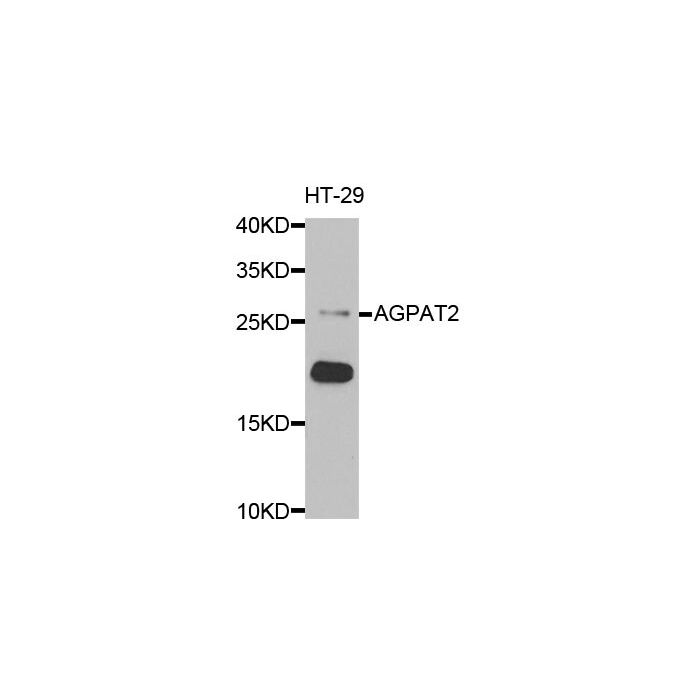AGPAT2 polyclonal, anti-human, mouse
€388.00
In stock
SKU
BS6318
Background:
Phosphatidic acid and lysophosphatidic acid are phospholipids involved in lipid biosynthesis and signal transduction. LPAAT-β (lysophosphatidic acid acyltransferase, beta), also known as AGPAT2, BSCL, BSCL1, LPAAB or 1-AGPAT2 (1-acylglycerol-3-phosphate O-acyltransferase 2), is a multi-pass membrane protein localized to the endoplasmic reticulum that catalyzes the synthesis of phosphatidic acid from lysophosphatidic acid. Predominantly expressed in heart and liver, LPAAT-β belongs to the LPAAT family of proteins that have a well-known role in lipid biosynthesis. In addition, LPAAT family members may also play a role in tumor progression. Mutations in the gene encoding LPAAT-β can result in the autosomal recessive disorder CGL1 (congenital generalized lipodystrophy type 1). CGL1, also known as Berardinelli-Seip congenital lipodystrophy type 1 (BSCL1), is a disorder characterized by insulin resistance, early onset of diabetes, hepatic steatosis, scarcity of adipose tissue and hypertriglyceridemia.
Alternative Name:
1-acyl-sn-glycerol-3-phosphate acyltransferase beta , 1-acylglycerol-3-phosphate O-acyltransferase 2, 1-AGP acyltransferase 2, 1-AGPAT 2, Lysophosphatidic acid acyltransferase beta, LPAAT-beta, AGPAT2
Application Dilution: WB: 1:500 - 1:2000, IF: 1:50 - 1:100
Specificity: AGPAT2 polyclonal antibody detects endogenous levels of AGPAT2 protein.
Immunogen:
Recombinant full length Human AGPAT2.
MW: ~ 31 kDa
Swis Prot.: O15120
Purification & Purity:
The antibody was affinity-purified from rabbit antiserum by affinity-chromatography using epitope-specific immunogen and the purity is > 95% (by SDS-PAGE).
Format:
1mg/ml in PBS with 0.1% Sodium Azide, 50% Glycerol.
Storage:
Store at 4°C short term. Aliquot and store at -20°C long term. Avoid freeze-thaw cycles.
For research use only, not for use in diagnostic procedure.
Phosphatidic acid and lysophosphatidic acid are phospholipids involved in lipid biosynthesis and signal transduction. LPAAT-β (lysophosphatidic acid acyltransferase, beta), also known as AGPAT2, BSCL, BSCL1, LPAAB or 1-AGPAT2 (1-acylglycerol-3-phosphate O-acyltransferase 2), is a multi-pass membrane protein localized to the endoplasmic reticulum that catalyzes the synthesis of phosphatidic acid from lysophosphatidic acid. Predominantly expressed in heart and liver, LPAAT-β belongs to the LPAAT family of proteins that have a well-known role in lipid biosynthesis. In addition, LPAAT family members may also play a role in tumor progression. Mutations in the gene encoding LPAAT-β can result in the autosomal recessive disorder CGL1 (congenital generalized lipodystrophy type 1). CGL1, also known as Berardinelli-Seip congenital lipodystrophy type 1 (BSCL1), is a disorder characterized by insulin resistance, early onset of diabetes, hepatic steatosis, scarcity of adipose tissue and hypertriglyceridemia.
Alternative Name:
1-acyl-sn-glycerol-3-phosphate acyltransferase beta , 1-acylglycerol-3-phosphate O-acyltransferase 2, 1-AGP acyltransferase 2, 1-AGPAT 2, Lysophosphatidic acid acyltransferase beta, LPAAT-beta, AGPAT2
Application Dilution: WB: 1:500 - 1:2000, IF: 1:50 - 1:100
Specificity: AGPAT2 polyclonal antibody detects endogenous levels of AGPAT2 protein.
Immunogen:
Recombinant full length Human AGPAT2.
MW: ~ 31 kDa
Swis Prot.: O15120
Purification & Purity:
The antibody was affinity-purified from rabbit antiserum by affinity-chromatography using epitope-specific immunogen and the purity is > 95% (by SDS-PAGE).
Format:
1mg/ml in PBS with 0.1% Sodium Azide, 50% Glycerol.
Storage:
Store at 4°C short term. Aliquot and store at -20°C long term. Avoid freeze-thaw cycles.
For research use only, not for use in diagnostic procedure.
| Is Featured? | No |
|---|
Write Your Own Review

